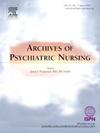研究青少年健康促进行为与游戏成瘾之间的关系
IF 2.2
4区 医学
Q1 NURSING
引用次数: 0
摘要
目的 青春期被定义为从童年到成年的过渡时期。本研究旨在研究土耳其青少年样本中健康促进行为与游戏成瘾之间的关系。我们使用 "青少年健康促进量表 "和 "青少年游戏成瘾量表"(简表)收集数据。患有慢性疾病和健康状况较差的青少年的数字游戏成瘾量表得分更高(P < 0.05)。年龄、母亲受教育程度、收入水平、健康认知和玩数字游戏的时间长短对青少年健康促进行为的影响有显著差异(p <0.05)。青少年游戏成瘾量表的平均得分与生活欣赏(p < 0.01)、健康责任(rSpearman = -0.290,p < 0.01)、运动(rSpearman = -0.154,p <;0.01)、压力管理(rSpearman = -0.122,p <;0.01)、营养分维度(rSpearman = -0.200,p <;0.01)和总均分(rSpearman = -0.257,p <;0.01)。回归分析结果表明,青少年的健康促进行为可以预测数字游戏成瘾(p <0.01)。结论了解影响青少年健康促进行为和游戏成瘾的因素对于儿科护士识别有游戏成瘾风险的青少年并采取必要的预防措施非常重要。本文章由计算机程序翻译,如有差异,请以英文原文为准。
Examination of the relationship between health promotion behavior and game addiction in adolescents
Objectives
Adolescence is defined as the transition period from childhood to adulthood. The present study aimed to examine the relationship between health promotion behavior and game addiction in a sample of Turkish adolescents.
Methods
The sample consisted of 340 adolescents aged 10–14 years (50.70 % boys). We collected the data using the ‘Adolescent Health Promotion Scale’ and ‘Adolescent Game Addiction Scale’ (Short Form).
Results
It was determined that 87.3 % of the adolescents played digital games. Adolescents with chronic diseases and poor health status had higher digital game addiction scale scores (p < 0.05). There is a significant difference between health promotion behaviors of adolescents according to age, mother's education level, income level, health perception, and duration of playing digital games (p < 0.05). There is a significant difference between the mean scores of adolescents' game addiction scale and life appreciation (p < 0.01), health responsibility (rSpearman = −0.290, p < 0.01), exercise (rSpearman = −0.154, p < 0.01), stress management (rSpearman = −0.122, p < 0.01), nutrition sub-dimension (rSpearman = −0.200, p < 0.01) and total mean scores (rSpearman = −0.257, p < 0.01). The results of the regression analysis showed that the adolescent's health promotion behaviors predicted digital game addiction (p < 0.01). In terms of self-esteem in children, only the health responsibility of the adolescents was a significant predictor (p < 0.01).
Conclusion
Knowing the factors affecting adolescents' health promotion behaviors and game addiction is very important for pediatric nurses to identify adolescents who are at risk for game addiction and take necessary precautions.
求助全文
通过发布文献求助,成功后即可免费获取论文全文。
去求助
来源期刊
CiteScore
3.70
自引率
0.00%
发文量
131
审稿时长
160 days
期刊介绍:
Archives of Psychiatric Nursing disseminates original, peer-reviewed research that is of interest to psychiatric and mental health care nurses. The field is considered in its broadest perspective, including theory, practice and research applications related to all ages, special populations, settings, and interdisciplinary collaborations in both the public and private sectors. Through critical study, expositions, and review of practice, Archives of Psychiatric Nursing is a medium for clinical scholarship to provide theoretical linkages among diverse areas of practice.

 求助内容:
求助内容: 应助结果提醒方式:
应助结果提醒方式:


